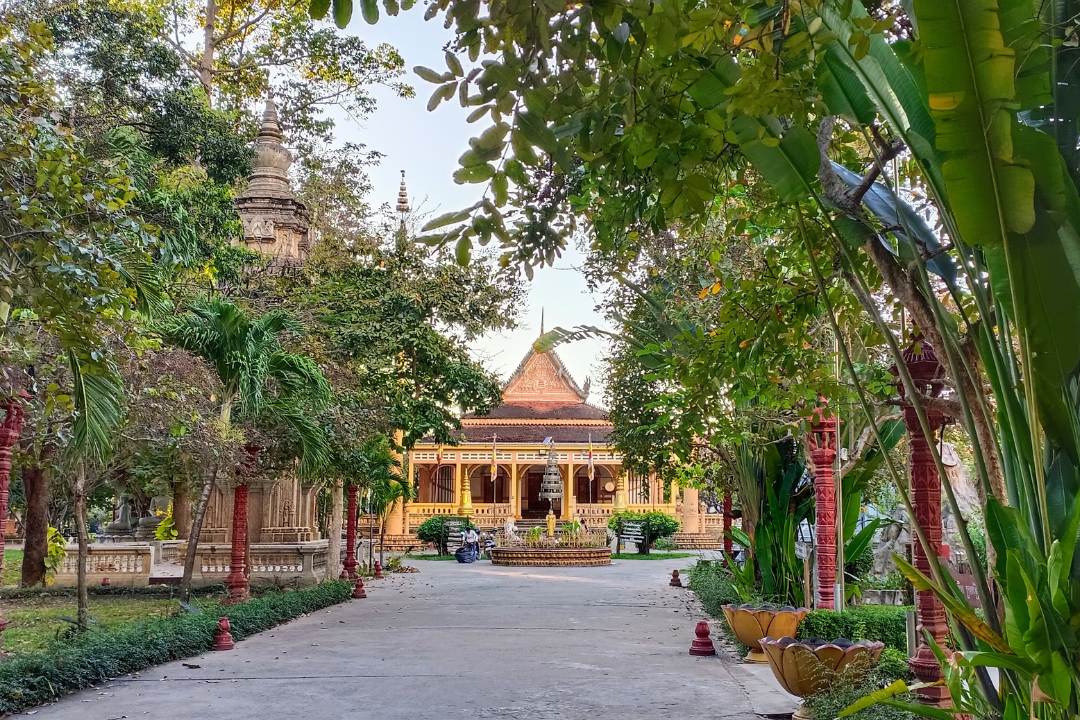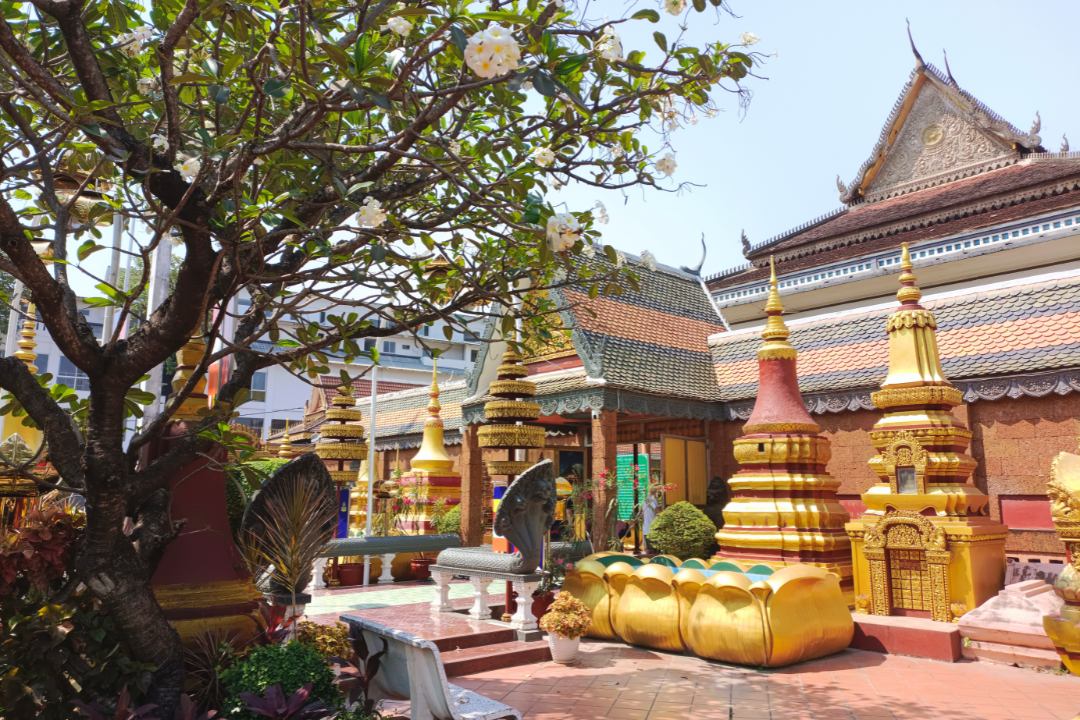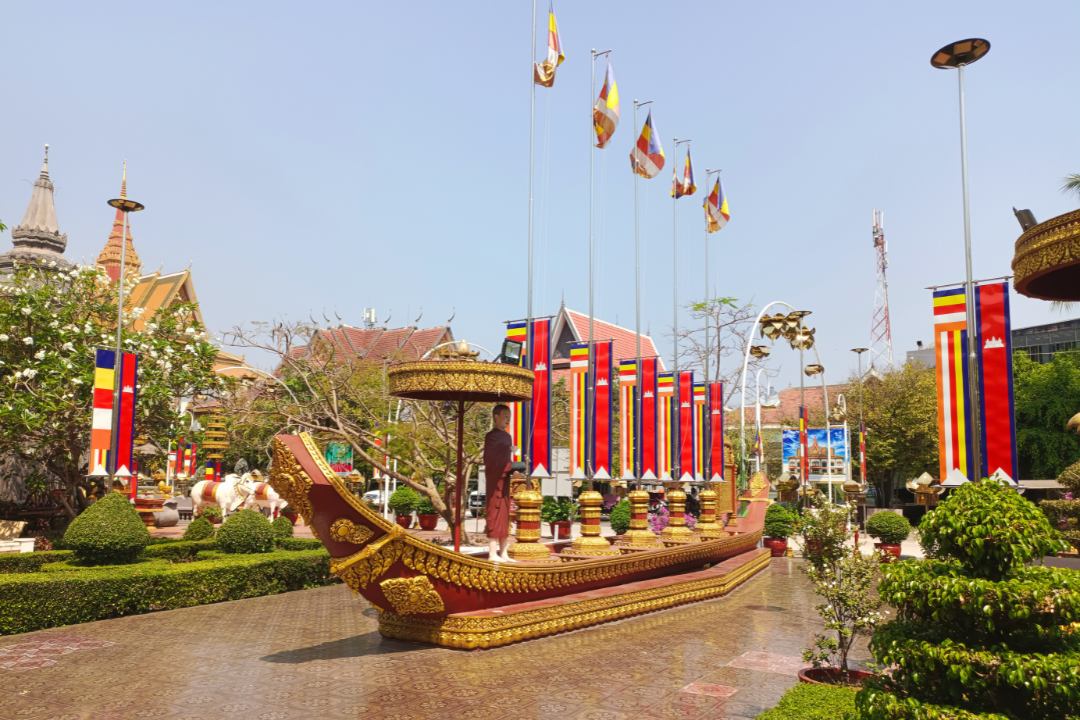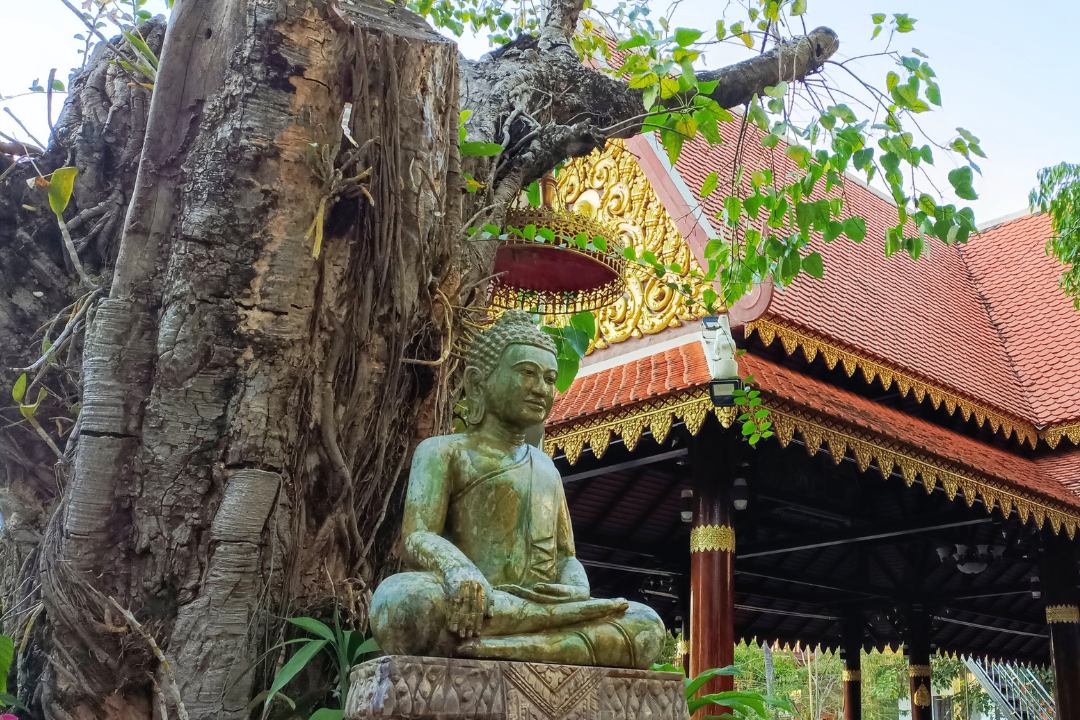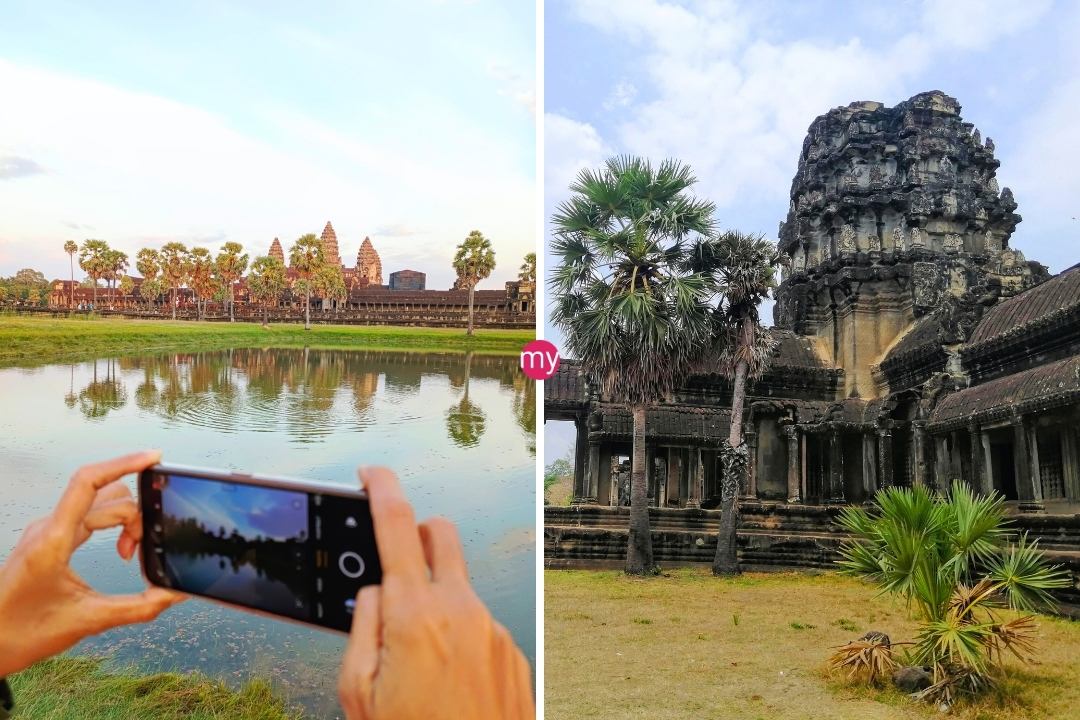Num Ansom Chek
The Sweet Cambodian Secret that Will Make You Fall in Love with Sticky Rice Forever!
Unlock the Tasty Tradition: How This Steamed Banana Sticky Rice Cake is Stealing the Spotlight in Cambodian Celebrations!
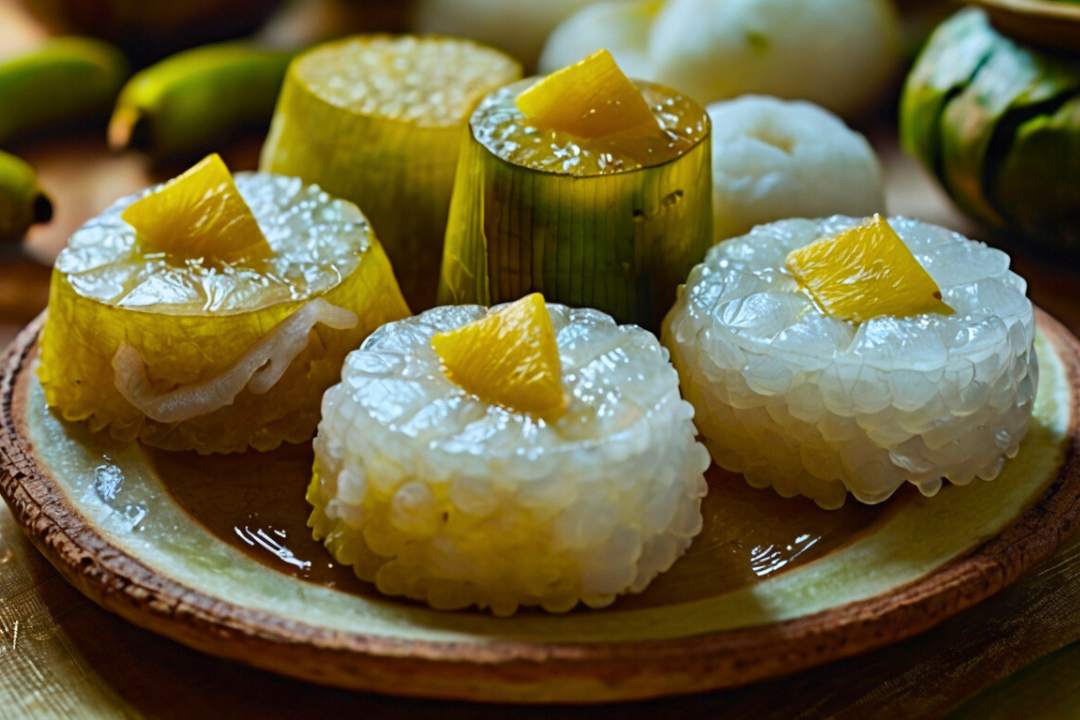
Recipe Index
- Fish Amok
- Lok Lak (Stir-fried Beef)
- Nom Banh Chok (Khmer Noodles)
- Samlor Korko (Stirring Pot Soup)
- Beef Saraman Curry
- Char Kroeung Sach Ko (Stir-fried Lemongrass Beef)
- Bai Sach Chrouk (Pork and Rice)
- Kuy Teav (Noodle Soup)
- Prahok Ktis (Pork and Coconut Dip)
- Num Ansom Chek (Banana Sticky Rice Cake)
- Lap Khmer (Lime-marinated Khmer Beef Salad)
- Char Kdav (Caramelized Palm Sugar Chicken)
- Maam Snoul (Fermented Fish)
- Nom Kong (Khmer Donuts)
- Twa Ko (Khmer Sausage)
Imagine a dessert so simple, yet so irresistible, that it’s been a staple in Cambodian celebrations for generations.
Ansom Chek isn’t just any sticky rice cake—it’s a delicious piece of history wrapped in a banana leaf, ready to blow your taste buds away!
Discover why this traditional treat is more than just food—it’s a flavorful experience that brings families together and keeps the essence of Khmer culture alive.
Prepare to crave a taste of this legendary dessert that’s stealing the show in every Cambodian festival!
Num Ansom Chek (នំអន្សមចេក)
Overview
Num Ansom Chek, also known as Cambodian Banana Sticky Rice Cake, is a beloved traditional dessert in Khmer cuisine. This sweet treat consists of glutinous rice filled with ripe banana, wrapped in banana leaves, and steamed to perfection. The result is a fragrant, slightly sweet cake with a unique texture that’s enjoyed during festivals and special occasions.
Cultural Significance
Role in Khmer Traditions
Num Ansom Chek plays a significant role in Cambodian cultural and religious ceremonies. It’s often prepared for important occasions such as Pchum Ben (Ancestors’ Day) and Khmer New Year, symbolizing respect for ancestors and unity within the community.
Symbolic Meaning
The cylindrical shape of the cake is said to represent longevity, while the use of banana leaves symbolizes nature’s bounty. The sticky rice binding the ingredients together is seen as a metaphor for family cohesion and community bonds.
When It’s Eaten
While Num Ansom Chek can be enjoyed year-round, it’s particularly prevalent during festivals and celebrations. In Siem Reap, tourists can find it in local markets, especially during traditional holidays, and sometimes in restaurants offering authentic Khmer desserts.
Key Information
- Preparation Time: 30 minutes
- Cooking Time: 1 hour
- Total Time: 1 hour 30 minutes (plus 2 hours for soaking rice)
- Difficulty Level: Medium
- Servings: 8-10 cakes
Ingredients
- 2 cups glutinous rice, soaked for at least 2 hours
- 4-5 ripe bananas, preferably a local Cambodian variety
- 1/2 cup coconut milk
- 1/4 cup sugar
- 1/4 tsp salt
- Banana leaves for wrapping
- String or toothpicks for securing
Notes on Ingredients
- Glutinous rice (also known as sticky rice) can be found at the Old Market (Psar Chas) in Siem Reap.
- If banana leaves are unavailable, you can use parchment paper as a substitute, though it will affect the traditional flavor.
Instructions
Preparing the rice:
- Drain the soaked glutinous rice.
- Mix rice with coconut milk, sugar, and salt.
- Let the mixture sit for 15 minutes to absorb flavors.
Preparing banana leaves:
- Clean banana leaves thoroughly.
- Cut into rectangles about 20cm x 15cm.
- Quickly pass leaves over a flame to make them pliable.
Assembling the cakes:
- Place a banana leaf shiny side down.
- Spread about 3 tablespoons of the rice mixture in the center.
- Place a whole or half banana (depending on size) in the center of the rice.
- Fold the sides of the leaf over, then roll to form a cylinder.
- Secure ends with string or toothpicks.
Cooking:
- Arrange the wrapped cakes in a steamer basket.
- Steam for about 1 hour, or until the rice is fully cooked and sticky.
- Remove from heat and let cool slightly before serving.
Serving Suggestions
- Num Ansom Chek is typically served warm or at room temperature.
- Unwrap the banana leaf just before eating to enjoy the full aroma.
- Some prefer to dip it in coconut milk or sprinkle with grated coconut.
Beverage Pairings
- Non-alcoholic: Hot green tea or sweetened ginger tea.
- Alcoholic: A sweet dessert wine like Muscat or a coconut-based cocktail.
Nutritional Information
- Calories: Approximately 200 per cake
- Carbs: 45g
- Protein: 3g
- Fats: 2g
- High in complex carbohydrates and potassium from the banana
Variations
Regional Differences
- Some regions add black beans or mung beans to the filling.
- In certain areas, a savory version is made with pork and mung beans.
Modern Adaptations
- Some chefs in Siem Reap create fusion versions with chocolate or durian fillings.
- Health-conscious adaptations might use brown glutinous rice and reduce sugar content.
Cultural Notes
- The process of making Num Ansom Chek is often a communal activity, with families and neighbors coming together to prepare large batches for celebrations.
- The skill of wrapping these cakes perfectly is highly valued and often passed down through generations.
Chef’s Tips
- Choose bananas that are ripe but still firm for the best texture and flavor.
- Don’t overfill the banana leaves, as the rice will expand during steaming.
- If the banana leaves keep unraveling, use two leaves per cake for extra security.
Related Experiences
- “Cambodian Dessert Making Workshop” in Siem Reap, where you can learn to make Num Ansom Chek and other traditional sweets.
- Visit to a local banana plantation to learn about different varieties used in Khmer cuisine.
- Participation in a community Pchum Ben ceremony to see the cultural significance of this dessert firsthand.
Editor’s Note: Ready for a taste adventure? Num Ansom Chek isn’t just a dessert—it’s a journey through Cambodian culture. Whether you’re new to Khmer cuisine or a seasoned food lover, this is the treat you didn’t know you needed. Let’s unwrap the sweet secrets of this banana sticky rice cake and see why it’s the go-to dessert for any celebration in Cambodia!
Key Takeaways:
A Sweet Slice of Culture: Num Ansom Chek is more than just a dessert; it’s a celebration of Cambodian traditions, making it a must-try for anyone interested in the heart of Khmer culture.
Banana Magic: This sticky rice cake is stuffed with ripe bananas that add a natural sweetness, creating a perfect balance with the rich coconut-infused sticky rice.
Perfect for Festivals: Num Ansom Chek shines during Cambodian festivals like Pchum Ben and Khmer New Year, symbolizing family bonds and respect for ancestors.
Wrapped with Love: The banana leaf wrapping not only adds a unique aroma but also represents the natural abundance of Cambodia—a small detail with a big impact!
Community Cooking: Making Num Ansom Chek is often a family or community event, turning cooking into a social activity that strengthens ties and passes down culinary traditions.
Deliciously Versatile: While the classic version is sweet, regional variations and modern twists—like adding black beans or even chocolate—keep this dessert fresh and exciting.
Health Boost in a Bite: Packed with potassium from bananas and energy from sticky rice, Num Ansom Chek is a satisfying, nutrient-rich treat that powers your day with a taste of Cambodia.
A Skill Passed Down: The art of wrapping these cakes just right is a valued skill in Cambodian families, often taught by elders and perfected over generations.
A Market Favorite: If you’re in Siem Reap, don’t miss the chance to grab Num Ansom Chek at local markets—where the freshest, most authentic versions are always steaming hot and ready to eat.
Pair It Perfectly: Enhance your Num Ansom Chek experience by pairing it with a soothing cup of green tea or a coconut-based cocktail for a match made in dessert heaven.
Eco-Friendly Packaging: Banana leaves not only keep the cake fresh but are also an environmentally friendly option—good for your taste buds and the planet!
Featured
Explore more on My Siem Reap Tours
Koh Ker and Beng Mealea guided tour | Banteay Srei temple tour semi-private guided tour | Angkor Wat Sunrise shared tour | Koh Ker and Beng Mealea guided tour | Morning Siem Reap floating village tour | Afternoon Siem Reap floating village tour | Private Angkor Wat special tour | Kulen Waterfall small group guided Tour | Private Angkor Wat mix temples photo tour

